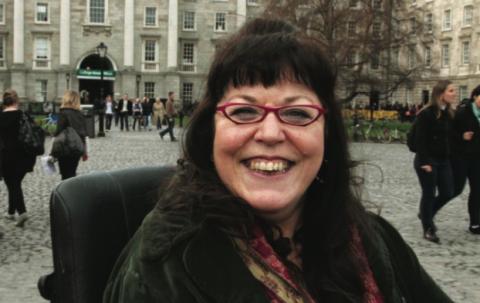My body politic

Colin Murphy interviews Seanad candidate, Traveller activist and playwright Rosaleen McDonagh
"I'm a posh pavee," says Rosaleen McDonagh, "a good little Traveller."
Rosaleen McDonagh is a playwright. She has three degrees. She also has cerebral palsy, uses a wheelchair, and has a speech impediment. And she is running for election to the Seanad.
"My disability is a camouflage for my Traveller identity. If I was a different sort of Traveller woman, without a disability, I'd be less amenable to settled people."
She has spent her life amongst those she calls "settled people". Born in Sligo (her mother was from Sligo, and father from Fermanagh), her cerebral palsy resulted in her being placed in an institution. She would join her family on the road during holidays ("I loved it"); eventually, when she was eleven, they moved to Dublin to be near her. She has 19 siblings.
The institution she was in was abusive, and she hated it: that, though, is another story. There were children of both physical and intellectual disability mixed together, and she received barely any education. At 18, she started attending the Institute of Education on Leeson Street. Four years later, she emerged with a Leaving Cert.
She went to Trinity, and studied English. She hated it, and had a breakdown: "that was very important – you deal with your crap." She returned to Trinity, and this time did a degree in theology and biblical studies. She is not particularly religious, though religion is "intrinsic to Travellers – you can't ignore it". She is pro-choice, and "pro women in the church, though I'm not sure why they'd want to".
Her faith is private, though clearly she has some. "When my parents died, within a year of each other, and then one of my friends took their own life, something held me together that was bigger than me."
After her degree, she did a masters in ethnic and racial studies. Did she enjoy college?
"No. It was lonely and isolating. I had no compass to tell me how to balance my Traveller identity with being a third level student, and graduate."
She spent the next ten years working for Pavee Point, the Traveller advocacy and support organisation, running a violence against women project. She loved it. But it wore her down. "I had seen mothers, and now their daughters were caught in the cycle of violence. I had seen too much."
She wrote a play (a striking, raw piece called Stuck, which premiered at the Project Arts Centre in 2006), turned 40, and left Pavee Point to do a masters in creative writing. Since, she has been a full-time writer. Her radio play, She's Not Mine, aired on RTÉ Radio 1 recently; she is currently under commission to the new writing theatre company, Fishamble. Still, "I'll always be an activist, in public and private."
McDonagh is, in many ways, the model of an "integrated" member of a minority. She lives in a Dublin city centre apartment; is extremely well educated; and is deeply involved in the society around her. As she says, she is "a good little Traveller".
Yet she rejects the model of "integration", resents being taken for granted ("even before I talk, people assume all sorts of things – that I'm liberal, left – I could be conservative for all they know"), and finds aspects of the "settled" world alien.
"I still know that, when I leave the room, I'm a dirty smelly knacker that they're going to talk about."
She worries that, if elected, she will be "going into a very settled environment".
"I've never trusted settled people. Yet in the election, I'll be relying on them to vote for me. The hardest aspect of it, emotionally, is that very few Travellers can vote."
This begs the question: why is she running? "I want to put up a red flag and say, 'I'm here!'
"I want settled people to say, where are the Travellers? Where are my Traveller neighbours, my Traveller politicians?"
But is it enough to campaign on being "different"?
"That difference is reflective of a large population that Irish society doesn't listen to."
